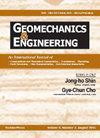Mechanical behavior of Beishan granite samples with different slenderness ratios at high temperature
IF 2.4
3区 工程技术
Q2 ENGINEERING, CIVIL
引用次数: 2
Abstract
This paper aims at the temperature and slenderness ratio effects on physical and mechanical properties of Beishan granite. A series of uniaxial compression tests with various slenderness ratios and temperatures were carried out, and the acoustic emission signal was also collected. As the temperature increases, the fracture aperture of intercrystalline cracks gradually increases, and obvious transcrystalline cracks occurs when T > 600°C. The failure patterns change from tensile failure mode to ductile failure mode with the increasing temperature. The elastic modulus decreases with the temperature and increases with slenderness ratio, then tends to be a constant value when T = 1000°C. However, the peak strain has the opposite evolution as the elastic modulus under the effects of temperature and slenderness ratio. The uniaxial compression strength (UCS) changes a little for the low-temperature specimens of T < 400°C, but a significant decrease happens when T = 400°C and 800°C due to phase transitions of mineral. The evolution denotes that the critical brittle-ductile transition temperature increases with slenderness ratio, and the critical slenderness ratio corresponding to the characteristic mechanical behavior tends to be smaller with the increasing temperature. Additionally, the AE quantity also increases with temperature in an exponential function.不同长细比北山花岗岩试样高温力学行为
研究了温度和长细比对北山花岗岩物理力学性能的影响。进行了一系列不同长细比、不同温度下的单轴压缩试验,并采集了声发射信号。随着温度的升高,晶间裂纹的断裂孔径逐渐增大,在T bb0 ~ 600℃时出现明显的跨晶裂纹。随着温度的升高,其破坏模式由拉伸破坏模式转变为延性破坏模式。弹性模量随温度的升高而减小,随长细比的增大而增大,在T = 1000℃时趋于恒定。在温度和长细比的影响下,峰值应变随弹性模量的变化趋势相反。低温试样单轴抗压强度(UCS)在T < 400℃时变化不大,但在T = 400℃和800℃时,由于矿物相变,单轴抗压强度下降明显。演化规律表明,脆性-韧性临界转变温度随长细比的升高而升高,与特征力学行为相对应的临界长细比随温度的升高而变小。此外,声发射量也随温度呈指数函数增加。
本文章由计算机程序翻译,如有差异,请以英文原文为准。
求助全文
约1分钟内获得全文
求助全文
来源期刊

Geomechanics and Engineering
ENGINEERING, CIVIL-ENGINEERING, GEOLOGICAL
CiteScore
5.20
自引率
25.00%
发文量
0
审稿时长
>12 weeks
期刊介绍:
The Geomechanics and Engineering aims at opening an easy access to the valuable source of information and providing an excellent publication channel for the global community of researchers in the geomechanics and its applications.
Typical subjects covered by the journal include:
- Analytical, computational, and experimental multiscale and interaction mechanics-
Computational and Theoretical Geomechnics-
Foundations-
Tunneling-
Earth Structures-
Site Characterization-
Soil-Structure Interactions
 求助内容:
求助内容: 应助结果提醒方式:
应助结果提醒方式:


